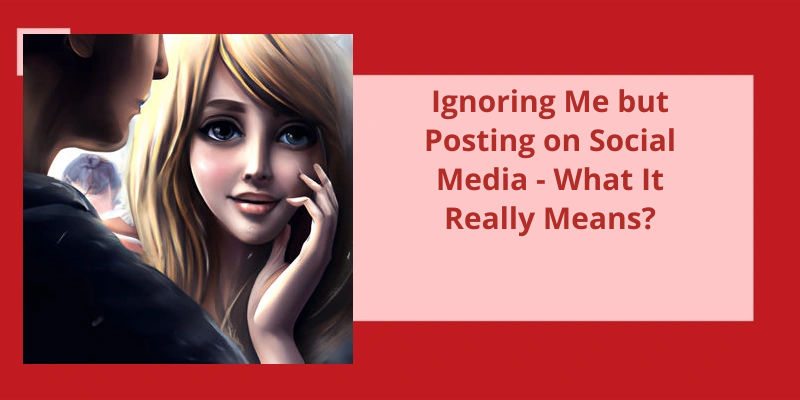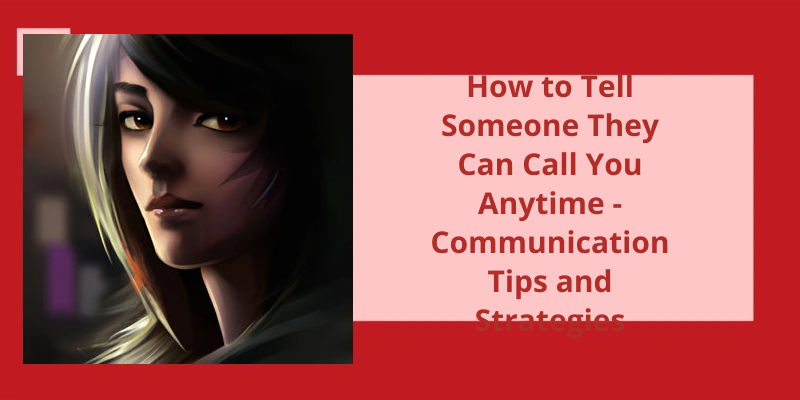In today's era of constant connectivity, social media has become an inescapable aspect of our lives. The ability to instantly connect with people all over the world has created a culture of constant communication that’s changed the way we interact with each other. However, with the rise of social media, a new problem has emerged: the act of ignoring people in real life while simultaneously posting about their lives online. It can be frustrating to see someone you care about posting regularly on social media, yet barely acknowledging your existence in person. This phenomenon has become increasingly common, raising concerns about the impact social media has on our interpersonal relationships. While social media can be a powerful tool for staying connected with others, it's important to remember the value of genuine human interactions in our daily lives.
Why Do People Ignore Your Text but Post on Social Media?
There could be various reasons behind a person ignoring your messages while actively posting on social media. The most likely reason is that they’re just not interested in you. It could be that they’ve found someone more interesting or engaging, or they may simply not be ready for a deeper connection with you. Whatever the reason, their behavior is a clear indication that you aren’t a priority to them.
Another reason for their behavior could be that they’re using social media as a way to avoid real-life interactions. Posting on social media allows people to present a carefully crafted image of themselves to the world, without having to engage in the messy, unpredictable nature of actual human connections. By ignoring your messages and posting on social media, they may be signaling their preference for a more superficial form of communication.
It’s also possible that the person is simply too busy or distracted to engage with you on a deeper level. In todays fast-paced and constantly connected world, it’s easy to get caught up in the endless stream of notifications and messages. Even the most well-intentioned individuals can struggle to keep up with the demands of social media, and sometimes it’s just easier to ignore some messages than to respond to all of them.
By withholding their attention and affirmation, they’re indicating that they hold the higher ground and that you’re subservient to them. This may be a conscious or subconscious strategy on their part, but it’s important to recognize and guard against such toxic behaviors.
Finally, it’s worth considering that the person may not be intentionally ignoring your messages at all. They may be dealing with personal issues or struggles that are consuming their attention and leaving them with little emotional or mental bandwidth to engage with others. In such cases, it’s important to be patient and understanding, rather than jumping to conclusions or making assumptions about the persons intentions. By approaching the situation with empathy and compassion, you may be able to build a deeper connection and overcome whatever obstacles are standing in the way of your relationship.
There are times when we feel ignored or overlooked by someone and all we want is their attention. Surprisingly, ignoring them could be the key to getting the reaction and attention we crave. But how do you ignore someone to get their attention? Here are some helpful tips to do just that.
How Do You Get Attention From Ignoring Someone?
When it comes to getting attention from someone by ignoring them, there are several key factors to keep in mind. Firstly, it’s important to consider why you want their attention in the first place. Is it because you genuinely value their connection or do you simply want to provoke a reaction? If your motivation is purely to play games or manipulate them, then this strategy is unlikely to yield positive results in the long run.
Another key element of ignoring someone is learning to breathe and stay calm in the face of their reactions or lack of engagement with you. Rather than getting frustrated or angry, try to focus on your own feelings and desires, and work on building a strong sense of self-worth and confidence that can help you navigate these situations.
Completing your own goals and pursuing your passions can also be a powerful tool for getting someones attention. When youre feeling fulfilled and productive, you radiate a sense of energy and excitement that can be contagious – and may well spark the curiosity or interest of the person youre trying to connect with.
At the same time, it’s important not to constantly ignore the person youre interested in. Instead, aim for a balance of interaction and space, and look for opportunities to give them the same attention and engagement that youre hoping to receive in return.
Finally, it can be helpful to tap into their competitive side by giving them a challenge or setting up a situation where they feel compelled to reach out and engage with you. This could involve something as simple as showcasing your own successes or achievements, or finding ways to highlight your unique qualities and talents in a way that captures their attention.
By following these tips and leveraging your own strengths and assets, you can increase your chances of success and build deeper, more meaningful connections with the people you care about.
How Ignoring Someone Can Affect a Relationship Negatively in the Long-Term.
When one person in a relationship frequently ignores the other, it can create a sense of disconnection and resentment over time. This lack of communication and acknowledgement can lead to feelings of loneliness, frustration, and even anger, which can ultimately damage the relationship in the long run.
There are various reasons why people tend to post on social media but not respond to texts promptly. It’s a common occurrence in today’s digital world, and it’s essential to understand why people engage in such behavior. In the next section, we’ll delve deeper into some of the possible causes of this phenomenon.
Why Do People Post on Social Media but Not Text Back?
Social media platforms are becoming increasingly ubiquitous in our daily lives. They offer us an opportunity to connect with friends and family, share our thoughts and feelings, and stay informed about the world around us. However, despite the many benefits of social media, there’s a growing problem that many people are experiencing: they post on social media but don’t text back.
One possible reason for this phenomenon is that people use social media as a way to take a quick break from work. Many jobs require long hours of focus and concentration, leaving little time for personal interaction. Social media provides a brief interlude where individuals can shift their attention away from their work and tune into their personal lives.
Another possible reason for this phenomenon is that people use social media as a way to distract themselves from daily dread. Life can be stressful and overwhelming at times, and social media can offer a temporary respite from our worries. Posting on social media provides an escape from our anxieties and allows us to focus on something else for a moment. Therefore, people may be less likely to text back if they’re using social media as a form of escapism.
For example, if someone is at a party or social event, they may quickly post online to document their experience without worrying about responding to texts in real-time. Alternatively, they may be multitasking and unable to respond to texts at the moment. In any case, social media provides a more efficient way to stay connected than texting back and forth.
Perhaps theyre not in the mood to talk at that moment or don’t feel like they’ve anything of substance to say. Posting something online is a way to signal to others that they’re still present and active, without feeling obligated to engage in lengthy text exchanges.
While it can be frustrating to not receive a response, it’s important to remember that everyone has their own reasons for their communication habits. Rather than getting upset, it may be worthwhile to have an open conversation about communication expectations and preferences with those in our lives.
Source: It’s OK to post on social media even though you haven’t …
It’s not uncommon to feel hurt and frustrated when someone intentionally ignores us. There are many reasons why someone might choose to do this, but regardless of the motive, being ignored can be a painful experience. In this article, we’ll explore some of the different terms used to describe this behavior, from formal words like “ostracization” to more colloquial phrases like “giving the cold shoulder.”
What Is It Called When Someone Ignores You?
Being ignored by someone can be a painful experience, especially if it’s someone we hold in high regard. It’s a feeling of being disregarded or neglected, which can lead to feelings of frustration, confusion, and hurt. Ignoring someone is a form of passive aggression, where the person chooses to withhold their attention intentionally.
One of the most painful forms of being ignored is ostracization. Ostracism occurs when someone is deliberately excluded from a group or society. It can be a form of punishment, where the individual is made to feel unwelcome, unwanted, and even disliked. The act of ostracizing can be devastating, and it can leave the person feeling isolated and alone.
Another way that someone can ignore us is by giving us the cold shoulder. This phrase is used to describe a situation where a person is unwilling to communicate or interact with someone. The person being ignored may feel that they’ve done something wrong, but often, the cause of the silence is unknown. The cold shoulder can be a way of expressing anger or frustration, but it can also be a way of avoiding conflict.
Blackballing is another way that someone may ignore us. It’s when someone is subjected to a negative vote or veto, often within a social or political setting. This act of exclusion can be seen as a way of discrediting the individual, and it can have long-lasting consequences for their reputation and social standing. Blackballing is often used as a form of bullying or intimidation.
Sending someone to Coventry is a British phrase that means to ignore someone completely. Historically, this phrase was used to describe a form of punishment where an individual was banished from their community. In modern times, the phrase is used to describe a social exclusion, where someone is ignored and shunned by others. This form of ignoring can be hurtful, and it can cause the person being ignored to feel isolated and alone.
The act of ignoring can take various forms, such as ostracism, giving the cold shoulder, blackballing, and sending someone to Coventry. These forms of exclusion can be a way of expressing anger or frustration, but they can also be a form of bullying and intimidation. It’s important to recognize and address the issues that lead to ignoring someone in order to maintain healthy relationships and a positive social environment.
The Psychological and Emotional Effects of Being Ignored
- Feeling unimportant and insignificant
- Reduced self-esteem and confidence
- Increased anxiety and stress
- Feelings of anger and frustration
- Depression and sadness
- Difficulty in trusting others
- Increased sensitivity to rejection
- Feeling isolated and lonely
- Negative impact on personal relationships
- Reduction in social interactions
Conclusion
In today's hyperconnected world, it's not uncommon for people to prioritize their online presence over their offline relationships. This trend has led to situations where individuals are being ignored by those who they care about, while these individuals continue to post and engage on social media platforms. While there may be valid reasons for this behavior, it's important to remember that true relationships require genuine communication and engagement. It's essential to actively maintain our relationships and to remember that the people in our lives are more than just the sum of their online profiles. Let's make an effort to unplug from our devices and make meaningful connections with the people around us.






